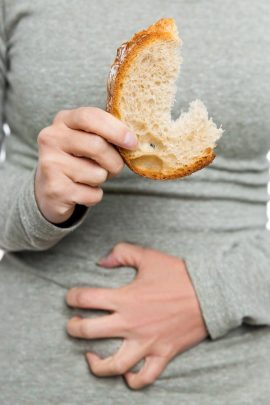Researchers hook into new human trials for people with a currently incurable medical condition

Coeliac disease is an immune reaction to eating gluten, which is found in wheat, rye, barley and oats.
There is currently no cure, and it can last for years or your lifetime.
It has a range of symptoms from diarrhoea, bloating, wind, fatigue and osteoporosis.
The main way to manage the symptoms is through a strict gluten-free diet; which includes items like bread, breakfast cereals, cakes, biscuits and pastry.
Now there is good news announced today for sufferers, with humans trials about to start, and it is all thanks to some worms.
The trials will involve giving patients a dose of worms which have shown to have a positive impact on the immune response.
Queensland Minister for Innovation, Science and the Digital Economy Leeanne Enoch said the Advance Queensland funded research would progress to human trials in three Queensland hospitals.
“The research, led by Dr Paul Giacomin from the Australian Institute of Tropical Health and Medicine at James Cook University in Cairns, is developing an effective treatment for people with coeliac disease,” Ms Enoch said.
“This has the potential to make a global impact in the treatment of people who live with coeliac disease.”
The $300,000 Advance Queensland Research Fellowship and the human trials mean not only hope for coeliac sufferers but also employment opportunities for research nurses, a clinical trial coordinator, trial monitoring personnel and support staff.
Dr Giacomin said the human trials, to be conducted at The Prince Charles Hospital in Brisbane, Logan Hospital, Townsville Hospital and New Zealand’s Christchurch Hospital, would run over two years.
“It might seem like an unlikely remedy, but we know that parasitic worms are able to survive in the human gut by dialling back our immune response, which is perfect for treating coeliac disease, which is an autoimmune disorder,” Dr Giacomin said.

“A small trial has already been conducted at the Prince Charles Hospital where coeliac patients were infected with parasitic hookworms.
“The trial was a success with patients able to eat a medium-sized bowl of pasta with no ill effects.”
He said the larger trials would enable the research team to study the mechanisms by which the worms control the immune response, helping the researchers to isolate the particular proteins the worms have that produced the anti-inflammatory effect.
Dr Giacomin ultimately hopes to develop a pill to treat coeliac disease.
Member for Stafford Dr Anthony Lynham congratulated Dr Giacomin on the early success of the trial.
“This potential treatment by Dr Giacomin has the possibility to change the lives of people living with Coeliac Disease, and I’m proud that the Prince Charles Hospital here in my electorate of Stafford is playing a part in this research,” Dr Lynham said.
Dr Giacomin was one of 54 Queensland scientists and researchers to share in $10 million in Advance Queensland research funding last year as part of the Palaszczuk Government’s commitment to build a strong and resilient knowledge economy in Queensland.
The Coelia Disease research is supported by funding from the Queensland Government, National Health and Medical Research Council, Coeliac Australia, The Prince Charles Hospital Foundation and the AITHM.








 Proudly Australian owned and operated
Proudly Australian owned and operated